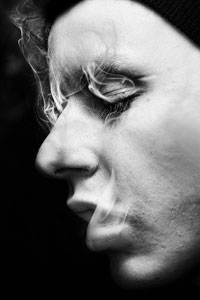Alec, I was immediately drawn to the wonderful, almost theatrical absurdity of this piece. Can you tell us more about writing ‘Winter’, and how it came into being?
Thank you. I’m not sure how this piece happened, really. I am in undergrad, and I live in a single dorm, and most of my writing is just me sitting down in my dirty room and stitching together sentences that sound weird to me. Usually I am working with an abusive parent or jilted lover. “Winter” is more tender than almost all of my recent work. I remember that with “Winter” I wanted my language to be at once clear and poetic, but I wanted the content entirely vague. But I don’t think I’m far enough along as a writer to skillfully manipulate form and content that way. So I ended up letting this one kind of bear and render itself. I wanted to disjoint time. I hope it turned out okay.
The narrator in this story takes care of his wife and her winter moods. But you end the story with the narrator’s mother. What is her role and how does she fit into this odd family?
I’m not sure. I think maybe there is something going on here with lack, desire, and the mother as a symbol for, or referent to, what can never be accessed or known. Your guess is as good as mine. For what it’s worth, I finished this story while in my “Kant’s Critique of Pure Reason” class. The story to me has something to do with taking responsibility for one’s death.
I love this line: “I fed the animals she kept close—a hungry dog, an iguana, a small girl, a dog.” It is both eerie and hilarious. How do you come up with such lines?
I like repetition. I like haunting and secret relations which are hinted at but never emerge, which hiss through the work (“a small girl”). I like brushing on things like abuse, mourning, and moral desolation, but never really getting there. I like sentences that are written with confidence, but that refer to absolutely nothing. Objectless sentences. I like, as a reader, having nothing to hold onto, and I think iguanas are fucking hilarious animals.
When you write a piece like ‘Winter’ which can be open to various interpretations, do you have a specific interpretation in mind, or is it as open for you as for your readers?
I have very little idea what “Winter” is trying to do, idea-wise. At this point, I never want to write or imagine closed fictions. Because, to me, the closure of a fiction is itself a fiction.
A year and a half ago, at the age of seventeen, you wrote a letter to the editor of the New York Times, and it was published. In that letter you wrote that the next Great American Novel, will come, basically, from you, or from someone very much like you. “We’re working on it,” you wrote. What prompted you to write this letter? Were you surprised it got published? What did you think of the various reactions in the blogosphere?
Part of me is glad that you brought this up: the other half wants to fall asleep at my laptop so I won’t have to answer this question. Short answer: A lot of seventeen-year-old artists like to bullshit themselves out of junvenilia. I happened to be the biggest bullshitter of them all. I was an entitled, teen-mouthed male, and I had a lot of time and I was pretty lonely, and I read books like conquering something small and automatic. Now I’m all about sensitive, careful reading, and writing that struggles straight from the throat—when I write, I’m brain-dead. But back then, I let my brain and phallus do the talking. I’m not sure why I wrote that letter. I like to think I’ve erased, or at least half-erased, whomever it was that “took the Times to task.” I met with vitriol from the blogosphere, and it was warranted, though the criticism did not come from anyone whom I now regard with any favor. I produced a novel that summer, and it’s one of the worst things no one will ever read. I feel like I’ve changed radically as a writer—and in how I experience stuff—since then.
Are you currently working on a novel? Could you tell us more about it? What are your plans for the future?
I’m working on what I hope will be a novella. The narrator is named Gainesville. It deals with infidelity and the ethics of love, or I hope it does. It’s extremely fragmented. I want to keep publishing in small, beautiful places like Smokelong. I think if my work fits anywhere, it’s around here, and I hope it stays that way for as long as possible.
When did you realize you were a writer? What inspires you?
I don’t believe that people “are” writers, but I realized that I wanted to write fiction in I guess my senior year of high school, which was also when I began reading literary fiction. I’m inspired by jealousy, my parents, jokes, Barry Hannah, the band This Will Destroy You, inadequacy, the fervor and dedication of the small press community, gchatting, Emmanuel Levinas, and the fact that there’s nothing else I could possibly do because I’m bad at everything except for writing.
Thank you for talking to us, Alec.



 The core workshop of SmokeLong Fitness is all in writing, so you can take part from anywhere at anytime. We are excited about creating a supportive, consistent and structured environment for flash writers to work on their craft in a community. We are thrilled and proud to say that our workshop participants have won, placed, or been listed in every major flash competition. Community works.
The core workshop of SmokeLong Fitness is all in writing, so you can take part from anywhere at anytime. We are excited about creating a supportive, consistent and structured environment for flash writers to work on their craft in a community. We are thrilled and proud to say that our workshop participants have won, placed, or been listed in every major flash competition. Community works.